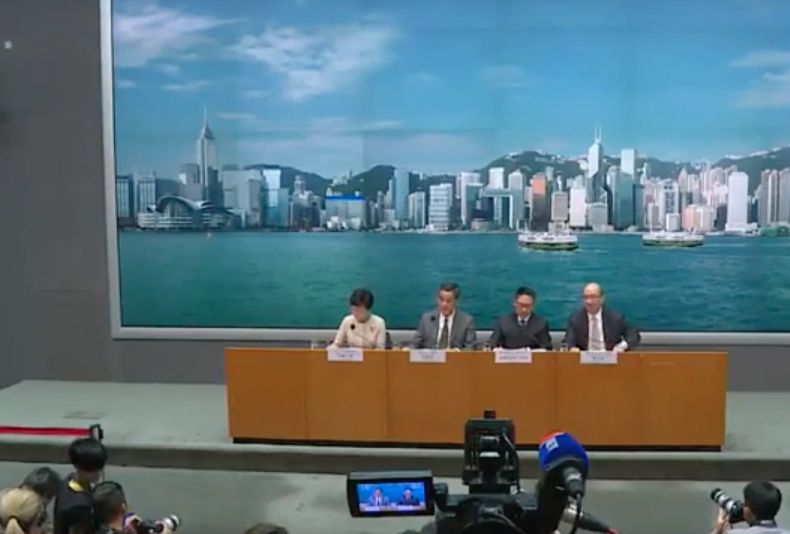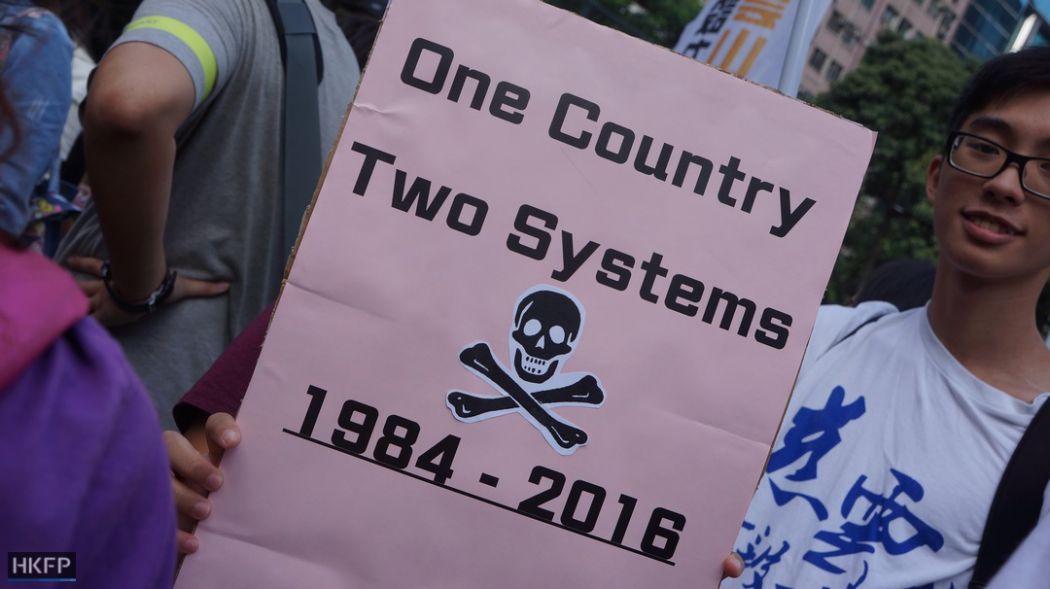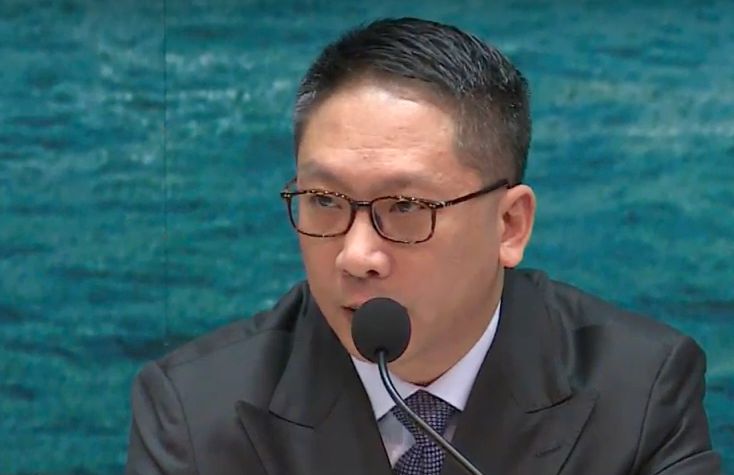Chief Executive CY Leung has said that he and the SAR government will fully implement a ruling by Beijing which will effectively bar two pro-independence politicians from the legislature.
Leung made his remarks on Monday at a press conference with Chief Secretary Carrie Lam, Secretary for Justice Rimsky Yuen, and Constitutional and Mainland Affairs secretary Raymond Tam.

“Any words or deeds that deliberately contravene [the interpretation’s] requirements, defy the prescribed oath-taking procedures, or even use the opportunity to insult the country and the Chinese people and advocate cessation, must be stopped in accordance with the law,” Leung said.
The Standing Committee of the National People’s Congress, China’s top legislative body, voted on and passed its interpretation of Article 104 of the Basic Law on Monday morning.
The article stipulates that, when assuming office, public officials, lawmakers, and members of the judiciary must swear to uphold the Basic Law and swear allegiance to the Hong Kong SAR.
”In English: The full text of Beijing’s ruling“
The Standing Committee of the Twelfth National people’s Congress examined at its Twenty-fourth Session the motion regarding the request for examination of the Draft Interpretation of Article 104 of the Basic Law of the Hong Kong Special Administrative Region of the People’s Republic of China submitted by the Council of Chairmen. Having consulted the Committee for the Basic Law of the Hong Kong Special Administrative Region under the Standing Committee of the National People’s Congress, the Standing Committee of the National People’s Congress has decided to make, under the provisions of Article 67(4) of the Constitution of the People’s Republic of China and Article 158(1) of the Basic Law of the Hong Kong Special Administrative Region of the People’s Republic of China, an interpretation of the provisions of Article 104 of the Basic Law of the Hong Kong Special Administrative Region of the People’s Republic of China regarding “When assuming office, the Chief Executive, principal officials, members of the Executive Council and of the Legislative Council, judges of the courts at all levels and other members of the judiciary in the Hong Kong Special Administrative Region must, in accordance with law, swear to uphold the Basic Law of the Hong Kong Special Administrative Region of the People’s Republic of China and swear allegiance to the Hong Kong Special Administrative Region of the People’s Republic of China” as follows:
1. “To uphold the Basic Law of the Hong Kong Special Administrative Region of the People’s Republic of China” and to bear “allegiance to the Hong Kong Special Administrative Region of the People’s Republic of China” as stipulated in Article 104 of the Basic Law of the Hong Kong Special Administrative Region of the People’s Republic of China, are not only the legal content which must be included in the oath prescribed by the Article, but also the legal requirements and preconditions for standing for election in respect of or taking up the public office specified in the Article.
2. The provisions in Article 104 of the Basic Law of the Hong Kong Special Administrative Region of the People’s Republic of China that “When assuming office”, the relevant public officers “must, in accordance with law, swear” bear the following meaning:
(1) Oath taking is the legal prerequisite and required procedure for public officers specified in the Article to assume office. No public office shall be assumed, no corresponding powers and functions shall be exercised, and no corresponding entitlements shall be enjoyed by anyone who fails to lawfully and validly take the oath or who declines to take the oath.
(2) Oath taking must comply with the legal requirements in respect of its form and content. An oath taker must take the oath sincerely and solemnly, and must accurately, completely and solemnly read out the oath prescribed by law, the content of which includes “will uphold the Basic Law of the Hong Kong Special Administrative Region of the People’s Republic of China, bear allegiance to the Hong Kong Special Administrative Region of the People’s Republic of China”.
(3) An oath taker is disqualified forthwith from assuming the public office specified in the Article if he or she declines to take the oath. An oath taker who intentionally reads out words which do not accord with the wording of the oath prescribed by law, or takes the oath in a manner which is not sincere or not solemn, shall be treated as declining to take the oath. The oath so taken is invalid and the oath taker is disqualified forthwith from assuming the public office specified in the Article.
(4) The oath must be taken before the person authorized by law to administer the oath. The person administering the oath has the duty to ensure that the oath is taken in a lawful manner. He or she shall determine that an oath taken in compliance with this Interpretation and the requirements under the laws of the Hong Kong Special Administrative Region is valid, and that an oath which is not taken in compliance with this Interpretation and the requirements under the laws of the Hong Kong Special Administrative Region is invalid. If the oath taken is determined as invalid, no arrangement shall be made for retaking the oath.
3. The taking of the oath stipulated by Article 104 of the Basic Law of the Hong Kong Special Administrative Region of the People’s Republic of China is a legal pledge made by the public officers specified in the Article to the People’s Republic of China and its Hong Kong Special Administrative Region, and is legally binding. The oath taker must sincerely believe in and strictly abide by the relevant oath prescribed by law. An oath taker who makes a false oath, or, who, after taking the oath, engages in conduct in breach of the oath, shall bear legal responsibility in accordance with law.
This Interpretation is hereby announced.
Beijing’s interpretation says that oath-takers are not allowed to retake their pledges and will be disqualified from assuming public office if they decline to take the oaths. In the interpretation, “decline” means deliberately reading out an altered oath or reading the oath in an insincere manner.

“I and the SAR government will implement the interpretation fully,” said Leung.
Article 23
When asked about Article 23 of the Basic Law, a provision which addresses national security and secession, Leung said that he thinks it has now become a practical question.
“I believe Hong Kong people in the past did not see the possibility of people advocating independence or secession, but now we see it. So this is a problem we should pay attention to.”

He said the “shall” in the provision means that Hong Kong should enact its own laws to prevent treason, secession, sedition, subversion against the Central People’s Government.
Leung also said that the NPCSC used its power carefully.
“This is only the fifth time in almost 20 years,” he said, in reference to past interpretations handed down from Beijing.
Retrospective action
Justice Secretary Rimsky Yuen said the court will decide whether the government’s legal challenge will have to be heard again. He denied that the interpretation amended Hong Kong’s laws, as it was in line with the spirit of the existing law and its decisions in past cases.

Rimsky Yuen said he has “every confidence” that the judiciary will defend the law, uphold the law and discharge their duties professionally after the interpretation.
He also said the Department of Justice will continue implementing the rule of law.
“Both judicial independence and interpretation can coexist, and they do coexist under our constitutional framework as housed in the Basic Law,” said Yuen.
In response to a question about whether he would resign, Yuen said resigning would be “no more than a gesture.”
